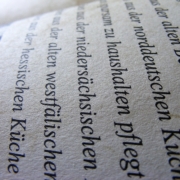Not only in Germany! 10 German words which are commonly used also in other languages
The German language: not as foreign as we think
It’s a fact, that learning German is not easy at all. Anyone who wants to learn this language must deal with a complex grammar, the existence of three genres (masculine, feminine and neutral), the length of the words and the basic unfamiliarity of each sound. In order to make the learning of German easier, we may remember that many words from German are actually used globally as an important part of the common language. For example, look at the following terms: Müsli, Strüdel, Kitsch, Bunker or Realpolitik. As we can see, the Teutonic influence is quite obvious in many different fields: food, culture, military or politics. Now, let’s focus on the most commonly used worldwide German words:
Hinterland
Literally meaning “the land behind”, is a common word in English, French, Spanish and Italian. Hinterland stands for “backcountry” or “a remote area of a country away from the city centre influenced by economics, society and culture”. For example, in Italy we often hear of “hinterland milanese”.
Schadenfreude
Common word used in English to express “joy” or “satisfaction” for one’s misfortunes. The Italian translation is “gioia maligna”.
Kindergarten
Literally “children’s garden”, it can be used in English as a synonym of “nursery school”.
Zeitgeist
This is a worldwide term used to express “the spirit of the time”. The expression comes from philosophy to indicate the ideal climate, culture and spirit (considered as characteristic of an era).
Wanderlust
Literally meaning “desire of walking” is commonly used in English in order to express “the craving for travel”.
Leitmotiv
Literally “guiding reason” is a global word which indicates “a motif or constant aspect of a literary or musical work” but also of “activities, manifestations and different behaviours”. Apart from the musical field, it has also become common to others.
Wunderkind
In English “wonder/prodigious child”.
Doppelgänger
It means in English “body double/alter ego”.
Spiel
Literally “play or game”. This term is used in English with the meaning of “eulogistic speech” or “long and boring speech”.
Delicatessen
Commonly shortened in Deli in English, Delicatessen means “culinary specialities shop”. The German word Delikatesse, which stands for “deliciousness”, derives from délicatesse, or “delicacy”.

